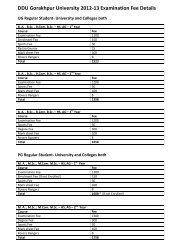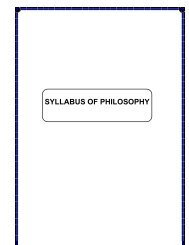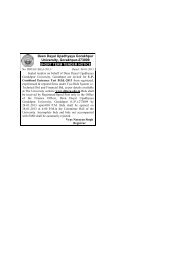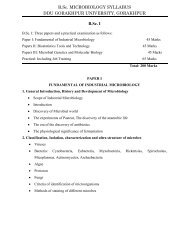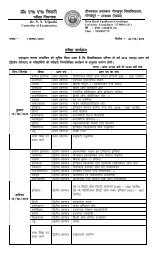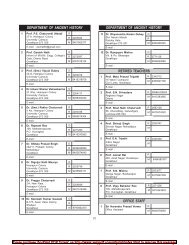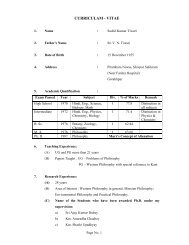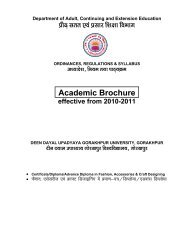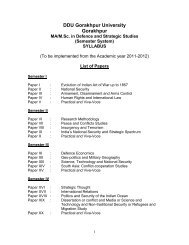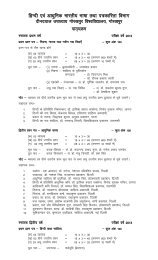PG Syllabus
PG Syllabus
PG Syllabus
Create successful ePaper yourself
Turn your PDF publications into a flip-book with our unique Google optimized e-Paper software.
1. Thermodynamics<br />
(a) Equilibrium Thermodynamics :<br />
M. Sc. (Previous)<br />
Paper–IV, Physical Chemistry–II<br />
(Thermodynamics, Chemical Kinetics and Electrochemistry)<br />
Joule–Thomson’s effect, thermodynamic reversibility, entropy changes in reversible and irreversible<br />
processes, Maxwell’s relations, thermodynamic equations of state, variation of entropy with temperature<br />
and pressure, Gibbs–Helmholtz equation.<br />
Criterion of equilibrium, temperature and pressure dependence of equilibrium constant, Vant Hoff<br />
equation, Clausius–Clapeyron equation.<br />
Partial molar quantities and their determination, chemical potential and its variation with temperature<br />
and pressure, Gibbs–Duhem equation, activity and fugacity, activity coefficients and their determination,<br />
thermodynamic treatment of solutions, elevation of boiling point, depression in freezing point, Nernst<br />
heat theorem, third law of thermodynamics, calorimetric and statistical methods of determination of<br />
absolute entropy, residual entropy, free energy and entropy of mixing, excess–functions.<br />
(b) Non-Equilibrium Thermodynamics :<br />
Postulates and methodology, Linear laws, Onsager reciprocal theory.<br />
2. Chemical Kinetics<br />
Reactions in solutions : Factors affecting the rate of reactions, (i) internal pressure of the solvent (ii)<br />
solvation of reactants and activated complexes, (iii) pressure.<br />
The study of fast reactions : Flow systems, relaxation methods and shock tubes. Flash photolysis,<br />
autocatalysis and oscillatory chemical reactions, the Lotka–Volterra mechanism, the Brusselator, the<br />
Oregonator, Bistability, Chemical chaos, Dynamics of Molecular Collisions–Reactive collisions and<br />
Potential energy surfaces.<br />
3. Electrochemistry<br />
Brief description of ionic association, Wein effect and Debye–Falkenhagen effect. Effect of ionic strength<br />
on the rate of ionic reactions, Primary and secondary salt effects.<br />
4. Electrical phenomena at interfaces<br />
The electrical double layer, electro kinetic phenomena. Electrode Processes : concentration polarization,<br />
deposition and decomposition potentials, overvoltage, limiting current density and dropping mercury<br />
electrode. The Butler-Volmer equation and brief description of cyclic voltammetry.<br />
Books<br />
1. Chemical Thermodynamics by R.P. Rastogi and R.R. Mishra<br />
2. Physical Chemistry by Atkins



